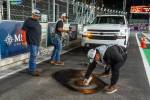How about ‘too big to go to jail’?
Forget about foreclosure statistics, declining prices and the alphabet soup of government programs promised to help strapped homeowners in Las Vegas.
What Las Vegas housing analyst Larry Murphy wants to know is why it's taking the market so long to recover. He's getting outraged.
"They said the banks were too big to fail. They should have said they were too big to jail," the president of SalesTraq housing research firm said. "When the banks can't prove they have the right to foreclose and they've gone through due process, if they skipped any steps or fabricated any evidence in the documents, that's fraud."
Murphy applauds Nevada Attorney General Catherine Cortez Masto for filing a lawsuit against Lender Processing Services, a Florida company that was alleged to be part of the robo-signing scandal in which thousands of foreclosure documents were falsely signed and notarized.
She also was behind Assembly Bill 284, which became law Oct. 1, requiring that lenders be able to prove they own the note before they start the foreclosure process.
Las Vegas attorney Matthew Callister followed up with a class action lawsuit against LPS, Bank of America, IndyMac Mortgage and others on behalf of local homeowners.
"The foreclosure crisis has been fueled by two main problems: chaos and speed," the lawsuit states. "The faster LPS is able to process foreclosures, without regard to accuracy of the documents or the integrity of the process, the more money LPS makes."
Murphy said these lawsuits raise the question of what's going to be the consequences.
What if plaintiffs are awarded a huge settlement? Will more people stop paying their mortgage?
Masto said she wants to prevent fraudulent foreclosure practices such as robo-signing, not prevent proper foreclosures.
"If it is true that people are living in their homes without making mortgage payments, AB 284 does not prevent banks from properly foreclosing on those individuals," she said.
Real estate attorney Mark Connot of Fox Rothschild in Las Vegas said fears of clouded ownership from the robo-signing scandal are overblown.
People who purchase bank-owned homes at auction and on the open market are not in danger of having the sale nullified because of an error in paperwork, he said.
"First of all, any dispute is with the bank, not the new purchaser," Connot said. "You have what's called a good-faith purchaser for the value.
"The law is going say those people who bought are protected because the bank got the title at the trustee auction."
Foreclosures declined in 2011 as five major mortgage servicers worked out a multistate settlement announced Wednesday by the Department of Justice.
The settlement will bring some closure to the uncertainty about rules and liability that the mortgage industry has faced since last year, causing foreclosures to increase, said Jed Kolko, chief economist and head of analystics at foreclosure listing service Trulia.com.
"The hitch is that some states might sit out the settlement, and only five large mortgage servicers are in negotiations, leaving open the possibility of numerous lawsuits by nonparticipating states and lawsuits against other mortgage players," Kolko said.
The only thing that can stop this mess is if banks grant principal reductions and simply write down home loans to current market value, housing analyst Murphy said.
Then people will stay in their homes.
Otherwise, Las Vegas could see a situation such as Cleveland, where thousands of vacant homes are being torn down because their value has gone to zero, and homes around them are going to zero, Murphy said.
"This is America where we're tearing down houses. Twenty-five percent of the nation is under water. Something is wrong," he said.
Contact reporter Hubble Smith at hsmith@
reviewjournal.com or 702-383-0491.























